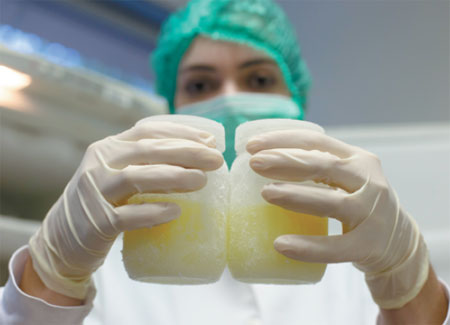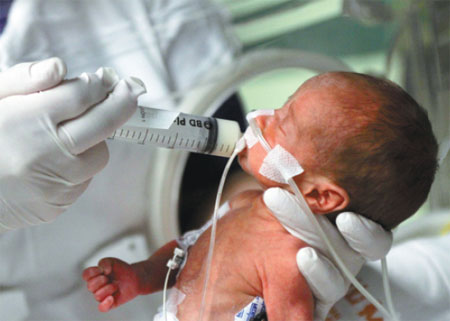Maternal milk banks set global standard
Thirty years ago, poor Brazilian women were paid to give away their breast milk, leaving their children at risk of malnourishment. Equipment at the few milk collection centers that existed was so costly, it limited the country's ability to expand the program's reach.
That has changed dramatically, thanks in part to Joao Arigio Guerrade Almeida, a chemist who has turned the Brazilian Milk Bank Network into a model studied by other countries and credited with helping slash infant mortality by two-thirds.
"Brazil is really the world leader in milk bank development," said Dr Lisa Hammer, a University of Michigan pediatrician who was part of a team visiting the Rio de Janeiro-based network last week.
Relatively rare in much of the world, donating breast milk is common in Brazil, where the network of banks works in much the same way as blood banks - testing, sorting and storing milk used mostly to feed premature infants in neonatal units.
When a mother is unable to breast-feed her baby due to illness, drug addiction or other problems, the network steps in to offer free milk. Last year, it collected milk from about 150,000 women to nourish about 155,000 babies.
Almeida recalled the trouble he saw on his first visit to a Rio milk bank in 1985.
"What I saw frightened me," he said. The system relied on "donations" from destitute mothers who often sold so much breast milk they were left without enough for their own infants.
Almeida lobbied for a ban on the sale of breast milk and sought alternatives to expensive imported equipment. High-end pasteurizing machines that cost $25,000 were swapped for $1,500 Brazilian-made machines used in food-testing laboratories. Jars made for mayonnaise or instant coffee were sterilized to store milk for freezing, replacing imported beaker tubes that had accounted for a whopping 89 percent of operating costs at Brazilian milk banks.
"We found ways of adapting the system to the reality of a developing country without compromising the quality and safety of the milk," said Almeida, 57. "We also shifted the focus from the child to the mother, making her into the protagonist."
Brazilian women increasingly are choosing to nurse, with the Health Ministry estimating more than half of mothers now breast-feed exclusively for their children's first six months of life.
In the US, that rate is 16.4 percent, according to the Centers for Disease Control.
Breast milk contains antimicrobial and anti-inflammatory substances that help prevent ailments such as diarrhea, which can be fatal to infants, and to promote long-term health in ways that dairy-based formulas do not. Premature babies given breast milk often avoid dangerous bowel conditions and other illnesses, allowing them to leave neonatal units sooner.
Use of breast milk also allows mothers to avoid using potentially contaminated water when they prepare formula for feedings.
Since 1985, Brazil's infant mortality rate has plummeted from 63.2 per 1,000 births to 19.6 in 2013.
|
A lab technician shows a couple of containers of frozen donated human milk at the Fernandes Figueira Institute in Rio de Janeiro, Brazil. Silvia Izquierdo / Associated Press |
|
A nurse feeds a newborn baby with donated milk at a hospital in Medellin, Colombia. The region's first Human Milk Bank opened recently. Fredy Builes / Reuters |
(China Daily 09/05/2014 page10)
















